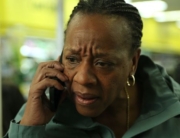In many ways, director Darren Aronofsky’s workmanlike approach to Samuel D. Hunter’s 2012 Off-Broadway play, adapted by the playwright, recalls many 1950s film adaptations of Broadway hits, which served largely as showcases for actors and the subtly subversive themes of the playwrights—Tennessee Williams fostered almost an entire genre. With some exceptions, the filmmakers barely hid the script’s stage-bound roots, often remaining within the limits of one setting. Although that does not in any way mean that the visuals were flat. If anything, cinematographer James Howe Wong’s high contrast visuals in The Rose Tattoo provided the atmosphere for Williams’s hothouse, florid drama. (If you wanted spectacle, there was a Biblical epic to turn to.)
Except for a few outdoor excursions into the outdoors, Aronofsky plants his camera in the modest two-bedroom apartment of college instructor Charlie (Brendan Fraser), and remains mostly trapped alongside the sofa-bound man. During the English teacher’s online Zoom writing classes, he’s the sole participant who has turned off his camera, the dark, faceless center of the Zoom gallery. He never steps foot outside, has food delivered daily from a local Italian eatery, and his one in-person contact with the outside world is the trusted, tell-it-like-it-is confidante Liz (Hong Chau), who, luckily for him, is a nurse. He has high blood pressure, difficulty breathing, and congestive heart failure. He weighs more than 600 pounds, and has limited mobility.
Fraser and Aronofsky don’t hold back on Charlie’s behavior. He only eats high calorie foods—for dinner, a bucket of fried chicken or two pepperoni pizzas drizzled with ranch dressing. However, there is no escaping that the writing still feels very much like a play, and not because it’s mainly dialogue driven or replete with confessional monologues. Characters come in and out of the apartment with the thinnest of motivations: his estranged daughter, the always angry Ellie (Sadie Sink), and a fumbling but earnest missionary, Thomas (Ty Simpkins). They have no ostensible purpose other than serving as antagonists or provocateurs to the ailing Charlie. In fact, the recluse first meets Thomas under the most embarrassing circumstances, when the stranger walks into his apartment unannounced while Charlie’s watching gay porn.
Ellie barges into his apartment under the flimsiest of excuses. She has been suspended from high school for threatening another student (and Ellie, in turn, has been bullied on social media) and somehow has nowhere else to go. But why now, this afternoon, does she confront a father she hasn’t seen in nearly eight years? The script wedges Ellie into the plot as a pot stirrer, to get a rise from Charlie, who nevertheless remains nearly unflappable. He lights up when he sees her, relieved that she has made contact. She’s a deux ex machina who has fallen into his lap: He wants to reconcile and be forgiven for leaving her and her for mother for a former male student. The two agree to form a transitional set of rules, where she’ll come over in the afternoon, and he’ll write her essays.
Thomas, the earnest missionary returns, at least he has motivation to intrude: He claims God brought him there. While Liz watches over Charlie, she has one suspicious eye open toward this newcomer. Besides offering aid and comfort to her longtime friend, she’s a walking font of exposition, disclosing to Thomas, in so many words, Charlie’s diagnosis: He will die soon.
Remarkably, there is little sense of claustrophobia, though this was filmed in the boxy 1.33:1 old-school framing. The director let’s his actors fill the space. Medium or close-up two-shots are used sparingly. Still, the production design has been bathed in dark aqua green (an allusion to the title, which, with the frequent references to Melville’s Moby Dick, takes on other meanings than the most obvious interpretation). The unvarying visuals add to the one-note, unchanging tone, while the flatness of most of the characters is highlighted in contrast to Charlie’s contradictory and conflicting impulses.
As the film builds to its climax, the saccharine-leaning musical score swells, one more sign of the conventional filmmaking. However, as Mary, the put-upon ex-wife and Ellie’s mom, a strong and focused Samantha Morton adds layers to her relatively brief screen time, setting off a much-needed charge. Finally, the tension is credible. Yet even the well-heeled, celebrity-filled audience at the New York premiere resisted the dramatic fireworks with laughter at one inopportune moment, when Mary describes her daughter as evil (The Bad Seed, anyone?).
It is remarkable that in Fraser’s performance, a human presence beams out through the thick layers of prosthetics encasing the actor. It’s all in his eyes: the vulnerability, the guilt. If only the director would let the actor alone. Yet any occasion to emphasize Charlie’s weight and his physical limitations are intentionally enhanced, drawing the viewer’s attention to the remarkably lifelike makeup artistry of Adrien Morot and his team. For example, Charlie takes off his shirt before shifting down the hallway toward his bedroom, with the aid of his walker. There’s also a full frontal shot of him in the shower—the R rating is for Ellie’s potty mouth, not for nudity, or maybe for the porn in the background too. These moments distractingly call attention yet again to the physical, overshadowing the acting. The director leaves viewers little room not to be reminded of what makeup artists can do in their craft.

















Leave A Comment